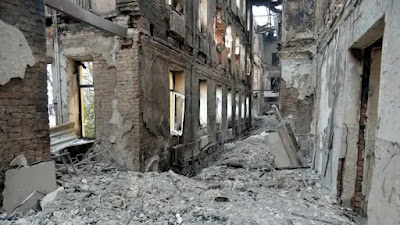For the Russians, the chance for a quick victory faded early on in the war when they failed to keep Antonov Airport airport in Kyiv after their air assault on 24 FEB 22 and the Ukrainians responded with unexpected resolve. Ukraine was not the nation and army the Russians faced in 2014.
However, even with the logistics nightmare, convoy issues, and the now well-meme'd farmers-stealing-abandoned-armor appearance of a rough time so far, the Russian continue to take ground. Slowly and steadily they advance.
They've bypassed most of the major urban centers in the classic "bypass and haul ass" operational scheme of maneuver, but now they need to clean up their lines and their rear. That means we are entering a new phase - taking the urban centers.
What can we expect in this phase? Well, the Russians have a track record here.
Via Jeremy Bowen at BBC;
Russia answers resistance with firepower. Rather than send in men to fight from house to house and room to room, their military doctrine calls for a bombardment by heavy weapons and from the air to destroy their enemies.
Kharkiv and the other cities and towns have suffered grievous damage, and as far as we know many civilian casualties. The seat of Kharkiv's local government was badly damaged in a missile strike that was filmed. Russian President Vladimir Putin might be sending a message to Kyiv - look to the east, because this could happen to you.
The depressing conclusion I've drawn from other wars in which I have seen Russians in action is that it could get much worse.
...
Before the invasion of Ukraine, military analysts assessed that Russia's forces were now much more professional. Perhaps they are, but Russia's invasion has once again been slowed by logistical bottlenecks, tactical mistakes and terrified teenagers who had not been told they were going to war - as well as resistance as fierce as anything the Chechens offered in 1995.
...
In Chechnya, Russia's answer was to use its firepower. In a few weeks, artillery and air strikes reduced the centre of Grozny, a typical concrete and steel Soviet city, to rubble. I was in Minutka Square, a centre of Chechen resistance, on a day when it was hit by repeated air strikes. Civilians were mostly in cellars, risking death every time they went out to find water or food.
...
The most devastated places I have seen in years of war reporting, apart from Grozny, were in Syria. The connection is the destructive power of the Russian military.
Mr Putin's decision to intervene in Syria saved the regime of Bashar al-Assad and took a big step towards his objective of restoring Russia as a world power. Two decisive victories over rebels in Syria, vitally important for the regime, were delivered by the ruthless use of Russian firepower.
The first was in Aleppo at the end of 2016. The eastern side of the city, which had been held by a variety of rebel factions throughout the war, fell after it was pulverised by shelling and air strikes. The Assad regime did not need any encouragement to shell Syrians, but the Russians brought a much greater level of destructive power. Strategic bombers based at home and in Iran delivered devastating strikes.
The tactic used in Syria was to encircle and besiege rebel-held areas, pound them from the air and from artillery batteries, and in the end exhaust the defenders and any civilians who had not managed to escape. Many of them were killed.
Is this the direction the Russians will head in Ukraine? They are as comfortable taking casualties as they are giving them. In some ways, they've already started with Grad rocket barrages from Kyiv to Karkiv. It is what they have a recent history of doing.
I see no reason why the war in Ukraine will be any different. We are in for an incredibly ugly few weeks, perhaps months...but hopefully not years.










No comments:
Post a Comment